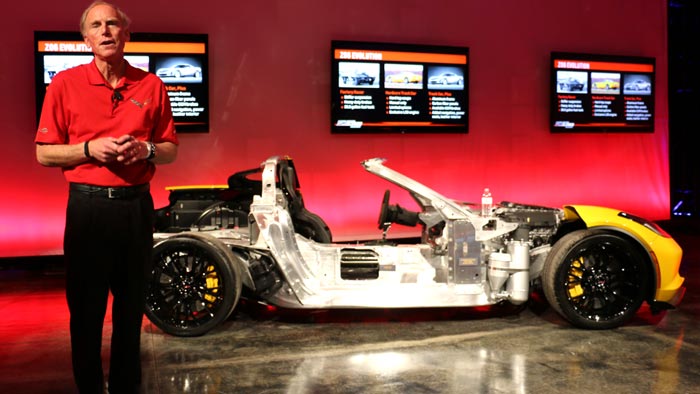Here’s a great interview with Corvette chief engineer Tadge Juechter by Stanford’s Graduate School of Business that offers probably the best insight into the genius behind the C7.
Tadge – after meeting him just one time at the National Corvette Museum, his personable demeanor makes you feel like you’ve known him for years – has been with General Motors for 37 years, long enough to see GM go from an arrogant “Apple Computer of its day” to an entity just struggling to survive to a company that has now reinvented itself and is making some of the best cars in the world.
It’s interesting to get Tadge’s take on why the Corvette has been able to survive – and thrive – for the past 63 years:
“It’s staying true to the mission of the car. Corvette has had its moments where it almost died. I don’t want it to seem like we’ve had a free ride the whole way. But if you look at other vehicles that are successful long term, they tend to stay true to their mission. They don’t try to wander off and be something they’re not. There are plenty of examples where cars tried to get bigger, or go from four passengers to two, or tried to migrate upmarket. They get cocky and think, ‘Wow, we could sell these things at a much higher price — let’s do an upscale version.’ That doesn’t work. You have to stay true to what you are.”
To those people who believe General Motors should be focusing on energy-efficient small cars to save the planet, Tadge has a quick answer:
“But what they don’t realize is that Corvette is the tip of the technology spear. What we do helps the whole portfolio because things that are great for making a sports car are also great for making an efficient car. We need very efficient engines to get high horsepower. We need great aerodynamics to get a high top speed, the exact same thing you need to have low drag in an efficient vehicle. A lot of the same technologies we push the envelope on apply to every market segment. We have a big poster here full of things where Corvette was first in the industry, and now they’re commonplace. We were the first composite body car, for example. Way ahead of the curve. Now most companies use composites.”
His take on the current push toward self-driving cars offers a great insight into why Tadge is at the helm of the Corvette and why it is such a great car.
He admits the technologically advanced Corvette will likely be “last to the party” when it comes to autonomous cars, saying “the whole purpose of our car is to enjoy the experience.”
“We want you to be the computer behind the wheel,” he adds.
But then I love his idea – the first time I’ve seen anyone espouse such a theory – about using the same autonomous technology in a beneficial way for the driving experience:
“For example, have the car be an on-track driving coach. You could use autonomous driving to show you the capabilities of a car on the track. I mean, this has already been proven — an autonomous car can drive the track the same way a racecar driver could. You have the car give drivers feedback when they’re deviating from optimal driving. You might even use that technology to scale up the level of assist you’re getting so you’re effectively coached by the car on how to drive quickly and safely on a racetrack. So even for what looks like a completely foreign technology to a sports car, we might be able to use it to create a unique driving experience.”
Can you imagine driving – or self-driving – a future Z06 that handles Road Atlanta the way Jordan Taylor does? Sounds like the ultimate thrill ride at Six Flags to us.
Click here to read entire Stanford Business interview with Tadge Juechter.
Source:
Stanford Business
Related:
Corvette Will Be the Last Vehicle to Go Autonomous
[VIDEO] What’s New for the 2016 Corvette
[VIDEO] Corvette Chief Engineer Denies Plans for a Mid Engine Corvette Zora ZR1
-


![[VIDEO] Chevrolet Was Prepared to Build the C7 and C8 Corvette Simultaneously [VIDEO] Chevrolet Was Prepared to Build the C7 and C8 Corvette Simultaneously](https://www.corvetteblogger.com/images/content/uploads/2024/04/042224_7-218x150.jpg)


An autonomous driving “school” setting in a Corvette would probably get major thumbs up from a whole contingent of owners. I think it’s a wonderful, creative use of the technology. I would also imagine it’s fraught with all sorts of legal ramifications. Is an OEM responsible if a car, while in “school” mode, kills a driver at the track. These are all questions being asked by both sides as driverless tech begins trickling into the everyday.
Comments are closed.